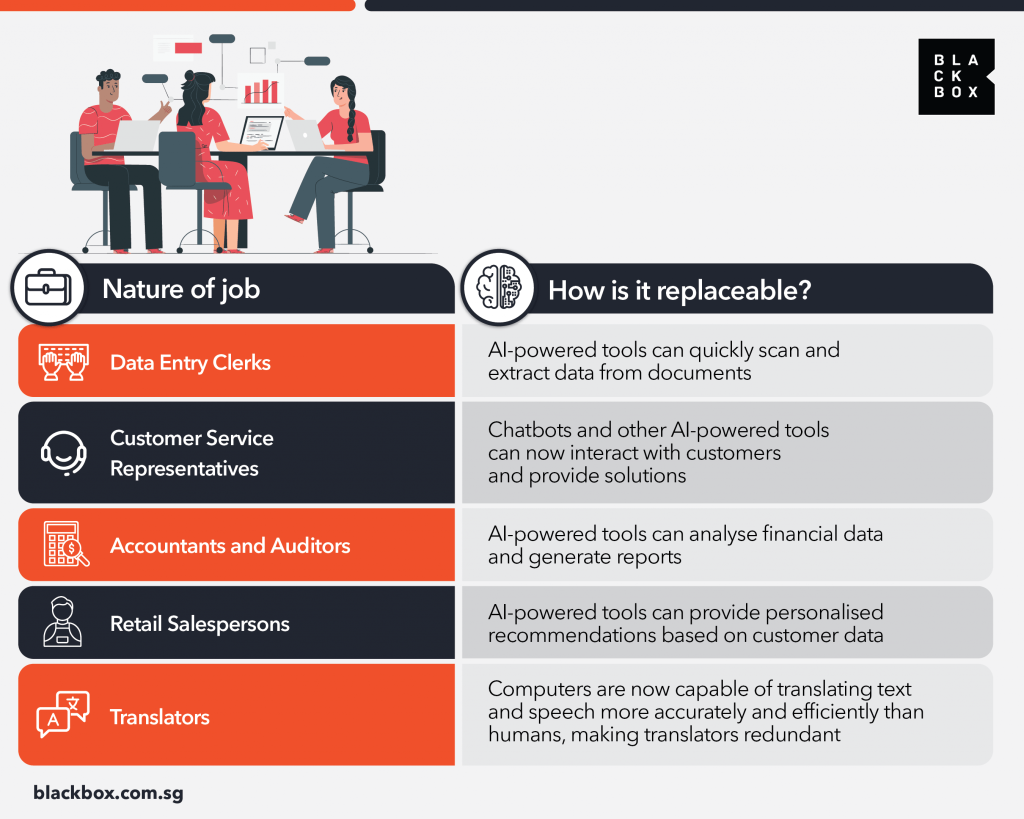For most of us, the possibility of artificial intelligence (AI) replacing our jobs must be at the top of our minds since the groundbreaking launch of ChatGPT.
We’re now in an era where technology is advancing at an unprecedented pace, reshaping the way we live and work.
While AI holds great promise in revolutionising various aspects of society — from improving healthcare to streamlining transportation — there is an underlying sense of unease when it comes to the future of employment.
This concern isn’t ungrounded. In fact, Goldman Sachs predicts that over 300 million jobs could be lost thanks to this fast-growing technology.
Furthermore, with most businesses prioritising cost reduction and operational efficiency, you don’t have to wait long until you lose your job. After all, who wouldn’t want to hire and employee than can work round the clock and doesn’t require breaks, benefits, or even a salary?
Which jobs are on the chopping block?

Some of the jobs that are most at risk of being replaced by AI-powered systems include routine and repetitive roles, such as those involving manufacturing, administration and customer service.
By 2030, up to 20 million manufacturing jobs globally will be lost to robots by 2030, while up to 46 per cent of office and administrative support jobs could also possibly be automated.
In customer service, AI-powered tools and chatbots, such as Shopee’s AI chatbot Sophie, can already interact with customers and provide solutions.
However, AI’s capabilities are not just limited to automating routine tasks. Advancements in natural language processing and machine learning algorithms have enabled AI systems to perform complex cognitive tasks, including data analysis, decision-making, and even creative endeavours.
As a result, professions that were once considered secure, such as accounting, legal services, and even some aspects of medical diagnostics, are now at risk of being taken over by AI.
Even my very own job as a content writer is threatened, as AI algorithms become increasingly capable of generating news articles, blog posts, and other forms of written content.
In the United States, the impacts of this disruptive tech are already being felt. AI has already started to take over jobs, contributing to nearly 4,000 job losses last month comprising a range of roles including those working clerical roles and in the creative industry.
It’s a bitter pill to swallow, but the fact remains that the replacement of jobs by AI is inevitable.
The AI revolution
But this isn’t necessarily a negative outcome. Despite the fact that AI has the potential to replace certain job roles, it does not imply that we will ultimately face unemployment or a bleak future.
Instead, AI will create jobs and bring about disruption — without leading to the destruction of the job market.
History has time and again demonstrated that the loss of jobs resulting from technological advancements is often counterbalanced by the creation of new jobs.
Throughout different eras, from the Industrial Revolution to the digital age, disruptive technologies have indeed displaced certain occupations. However, they have also given rise to entirely new industries, transforming the job market and creating a demand for new skills and expertise.
For instance, the transition from steam power to electricity during the Second Industrial Revolution caused job losses, but people eventually reskilled to adapt to these technological changes.
Similarly, during the Digital Revolution, the advent of computers and the Internet created previously non-existent job roles such as software engineers and cybersecurity specialists to fill the emerging demands of the time.
60 per cent of workers today are employed in occupations that did not exist in the 1940s, which means that over 85 per cent of employment growth over the past 80 years is attributed to the technology-driven creation of new positions.
Similarly, such would also be the case with AI’s emergence.
AI will create more jobs than it destroys
According to the World Economic Forum, AI will be able to create at least 12 million more jobs more than it destroys by 2025.
The development, implementation, and maintenance of AI systems by itself would require a skilled workforce specialising in areas such as AI programming, machine learning, data analysis, and ethical AI governance.
In Singapore, new roles including AI prompt engineers have cropped up. These prompt engineers create and curate prompts for chatbots like ChatGPT and can earn an upwards of US$335,000 (S$445,000) per annum.
Aside from this, AI can also unlock innovation and enable the creation of entirely new industries and business models as it becomes more integrated with society.
Just as the advent of digital streaming opened up new revenue streams for musicians beyond CDs and live performances, AI will foster the emergence of entrepreneurial ventures, startups, and organisations that harness its power to offer innovative products, services, and solutions.
Beyond job creation, as AI augments human capabilities, the job market will be significantly disrupted — this means that workers would have to learn how to adapt to AI and utilise it in their roles.
Some employers today even require the ability to utilise AI tools as a prerequisite for their certain positions in their company, including in Singapore.
Staying relevant in today’s job market
Instead of focusing on the negatives of AI displacing jobs, it’s important to embrace the disruption that comes with it to harness its benefits and create new opportunities.
In order to remain relevant in the workforce, individuals would have to reskill and upskill, and proactively acquire knowledge as well as abilities to align themselves with the demands of an AI-driven job market.
Some experts even recommend upskilling in areas where humans triumph over AI, including soft skills such as public speaking.
All in all, the key to overcoming the new wave of disruption AI brings lies in our ability to adapt, continuously learn, and embrace the possibilities that AI presents.
Featured Image Credit: Getty Images